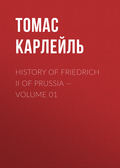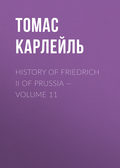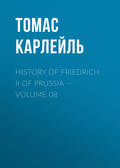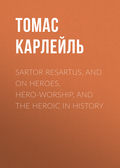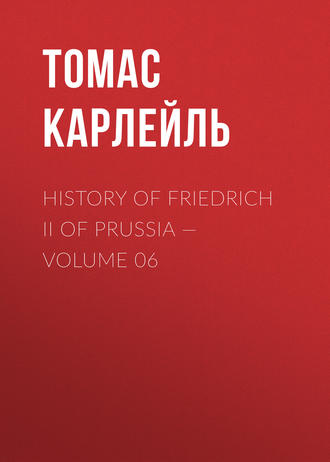
Томас Карлейль
History of Friedrich II of Prussia — Volume 06
In the first blaze of the outrage at Clamei, Friedrich Wilhelm's ardent mind suggested to him the method of single combat: defiance of George, by cartel, To give the satisfaction of a gentleman. There have been such instances on the part of Sovereigns; though they are rare: Karl Ludwig of the Pfalz, Winter-king's Son, for example, did, as is understood, challenge Turenne for burning the Pfalz (FIRST burning that poor country got); but nothing came of it, owing to Turenne's prudence. Friedrich Wilhelm sees well that it all comes from George's private humor: Why should human blood be shed except George's and mine? Friedrich Wilhelm is decisive for sending off the cartel; he has even settled the particulars, and sees in his glowing poetic mind how the transaction may be: say, at Hildesheim for place; Derschau shall be my second; Brigadier Sutton (if anybody now know such a man) may be his. Seconds, place and general outline he has schemed out, and fixed, so far as depends on one party; will fairly fence and fight this insolent little Royal Gentleman; give the world a spectacle (which might have been very wholesome to the world) of two Kings voiding their quarrel by duel and fair personal fence.
In England the report goes, "not without foundation," think Lord Hervey and men of sarcastic insight in the higher circles, That it was his Britannic Majesty who "sent or would have sent a challenge of single combat to his Prussian Majesty," the latter being the passive party! Report flung into an INVERSE posture, as is liable to happen; "going" now with its feet uppermost; "not without foundation," thinks Lord Hervey. "But whether it [the cartel] was carried and rejected, or whether the prayers and remonstrances of Lord Townshend prevented the gauntlet being actually thrown down, is a point which, to me [Lord Hervey] at least, has never been cleared." [Lord Hervey, Memoirs of George II. (London, 1848), i. 127.]
The Prussian Ministers, no less than Townshend would, feel well that this of Duel will never do. Astonishment, FLEBILE LULIBRIUM, tragical tehee from gods and men, will come of the Duel! But how to turn it aside? For the King is determined. His truculent veracity of mind points out this as the real way for him; reasoning, entreating are to no purpose. "The true method, I tell you! As to the world and its cackling,—let the world cackle!" At length Borck hits on a consideration: "Your Majesty has been ill lately; hand perhaps not so steady as usual? Now if it should turn out that your Majesty proved so inferior to yourself as to—Good Heavens!" This, it is said, was the point that staggered his Majesty. Tobacco-Parliament, and Borck there, pushed its advantage: the method of duel (prevalent through the early part of July, I should guess) was given up. [Bielfeld, Lettres familieres et autres (Second edition, 2 vols. Leide, 1767), i. 117, 118.] Why was there no Hansard in that Institution of the Country? Patience, idle reader! We shall get some scraps of the Debates on other subjects, by and by.—But hear Dubourgay again, in the absence of Morning Newspapers:—
AUGUST 9th, 1729. "Berlin looks altogether warlike. At Magdeburg they are busy making ovens to bake Ammunition-bread; Artillery is getting hauled out of the Arsenal here;" all is clangor, din of preparation. "It is said the King will fall on Mecklenburg;" can at once, if he like. "These intolerable usages from England [Seckendorf is rumored to have said], can your Majesty endure them forever? Why not marry the Prince-Royal, at once, to another Princess, and have done with them!"—or words to that effect, as reported by Court-rumor to her Majesty and Dubourgay. And there is a Princess talked of for this Match, Russian Princess, little Czar's Sister (little Czar to have Wilhelmina, Double-Marriage to be with Russia, not with England); but the little Czar soon died, little Czar's Sister went out of sight, or I know not what happened, and only brief rumor came of that.
As for the Crown-Prince, he has not fallen desperate; no; but appears to have strange schemes in him, deep under cover. "He has said to a confidant [Wilhelmina, it is probable], 'As to his ill-treatment, he well knew how to free himself of that [will fly to foreign parts, your Highness?], and would have done so long since, were it not for his Sister, upon whom the whole weight of his Father's resentment would then fall. Happen what will, therefore, he is resolved to share with her all the hardships which the King his Father may be pleased to put upon her." [Dubourgay, 11th August, 1729.] Means privately a flight to England, Dubourgay sees, and in a reticent diplomatic way is glad to see.
I possess near a dozen Hanoverian and Prussian Despatches upon this strange Business; but should shudder to inflict them on any innocent reader. Clear, grave Despatches, very brief and just, especially on the Prussian side: and on a matter too, which truly is not lighter than any other Despatch matter of that intrinsically vacant Epoch:—O reader, would I could bury all vacant talk and writing whatsoever, as I do these poor Despatches about the "eight cart-loads of hay"! Friedrich Wilhelm is fair-play itself; will do all things, that Earth or Heaven can require of him. Only, he is much in a hurry withal; and of this the Hanover Officials take advantage, perhaps unconsciously, to keep him in provocation. He lies awake at night, his heart is sore, and he has fled to drink. Towards the middle of August,—here again is a phenomenon,—"he springs out of bed in the middle of night," has again an EUREKA as to this of Clamei: "Eureka, I see now what will bring a settlement!" and sends off post-haste to Kannegiesser at Hanover. To Kannegiesser,—Herr Reichenbach, the special Envoy in this matter, being absent at the moment, gone to the Gohrde, I believe, where Britannic Majesty itself is: but Kannegiesser is there, upon the Ahlden Heritages; acquainted with the ground, a rather precise official man, who will serve for the hurry we are in. Post-haste; dove with olive-branch cannot go too quick;—Kannegiesser applying for an interview, not with the Britannic Majesty, who is at Gohrde, hunting, but with the Hanover Council, is—refused admittance. Here are Herr Kannegiesser's official Reports; which will themselves tell the rest of the story, thank Heaven:—
TO HIS PRUSSIAN MAJESTY (From Herr Kannegiesser).
No. 1. "DONE AT HANOVER, 15th AUGUST, 1729.
"On the 15th day of August, at ten o'clock in the morning, I received Two Orders of Council [these are THE EUREKA, never ask farther what they are]; despatched on the 13th instant at seven in the evening; whereupon I immediately went to the Council-chamber here; and informed the Herr von Hartoff, Private Secretary, who met me in a room adjoining, 'That, having something to propose to his Ministry [now sitting deliberative in the interior here; something to propose to his Ministry] on the part of the Prussian Ministers, it was necessary I should speak to them.' Herr von Hartoff, after having reported my demand, let me know, 'He had received orders from the Ministry to defer what I had to say to another time.'
"I replied, 'That, since I could not be allowed the honor of an audience at that time, I thought myself obliged to acquaint him I had received an Order from Berlin to apply to the Ministry of this place, in the name of the Ministers of Prussia, and make the most pressing instances for a speedy Answer to a Letter lately delivered to them by Herr Hofrath Reichenbath [my worthy Assistant here; Answer to his Letter in the first place]; and to desire that the Answer might be lodged in my hands, in order to remit it with safety.'
"Herr von Hartoff returned immediately to the Council-chamber; and after having told the Ministers what I had said, brought me the following answer, in about half-a-quarter of an hour [seven minutes by the watch]: 'That the Ministers of this Court would not fail answering the said Letter as soon as possible; and would take care to give me notice of it, and send the Answer to me.'"
That was all that the punctual Kannegiesser could get out of them. "But," continues he, "not thinking this reply sufficient, I added, 'That delays being dangerous, I would come again the next day for a more precise answer.'"
Rather a high-mannered positive man, this Kannegiesser, of the Ahlden Heritages; not without sharpness of temper, if the Hanover Officials drive it too far.
No. 2.—"AT HANOVER, 16th AUGUST, 1729.
"According to the orders received from the King my Master, and pursuant of my promise of yesterday, I went at noon this day to the Castle (SCHLOSS), for the purpose, of making appearance in the Council-chamber, where the Ministers were assembled.
"I let them know I was there, by Van Hartoff, Privy Secretary; and, in the mildest terms, desired to be admitted to speak with them. Which was refused me a second time; and the following answer delivered me by Van Hartoff: 'That since the Prussian Ministers had intrusted me with this Commission, the Ministers of this Court had directed him to draw up my yesterday's Proposals in writing, and report them to the Council.'
"Whereupon I said, 'I could not conceive any reason why I was the only person who could not be admitted to audience. That, however, as the Ministers of this Court were pleased to authorize him, Herr von Hartoff, to receive my Proposals, I was obliged to tell him,' as the first or preliminary point of my Commission, 'I had received orders to be very pressing with the said Ministers of this Court, for an Answer to a Letter from the Prussian Ministry, lately delivered by Herr Legationsrath von Reichenbach; and finding that the said Answer was not yet finished, I would stay two days for it, that I might be more secure of getting it. But that then I should come to put them in mind of it, and desire audience in order to acquit myself of the REST of my Commission.'
"The Privy Secretary drew up what I said in writing. Immediately afterwards he reported it to the Ministry, and brought me this answer: 'That the Ministers of this Court would be as good as their word of yesterday, and answer the above-mentioned Letter with all possible expedition.' After which we parted."
No. 3.—"AT HANOVER, 17th AUGUST, 1729
"At two in the afternoon, this day, Herr von Hartoff came to my house; and let me know 'He had business of consequence from the Ministry, and that he would return at five.' By my direction he was told, 'I should expect him.'
"At the time appointed he came; and told me, 'That the Ministers of the Court, understanding from him that I designed to ask audience to-morrow, did not doubt but my business would be to remind them of the Answer which I had demanded yesterday and the day before. That such applications were not customary among sovereign Princes; that they, the Ministers; 'dared not treat farther in that affair with me; that they desired me not to mention it to them again till they had received directions from his Britannic Majesty, to whom they had made their report; and that as soon as they received their instructions, the result of these should be communicated to me.'
"To this I replied, 'That I did not expect the Ministers of this Court would refuse me the audience which I designed to ask to-morrow; and that therefore I would not fail of being at the Council-chamber at eleven, next day,' according to bargain, 'to know their answer to the rest of my Proposals.'—Secretary Von Hartoff would not hear of this resolution; and assured me positively he had orders to listen to nothing more on the subject from me. After which he left me?"
No. 4.—"AT HANOVER, 18th AUGUST, 1729.
"At eleven, this day, I went to the Council-chamber, for the third time; and desired Secretary Hartoff 'To prevail with the Ministry to allow me to speak with them, and communicate what the King of Prussia had ordered me to propose.'
"Herr von Hartoff gave them an account of my request; and brought me for answer, 'That I must wait a little, because the Ministers were not yet all assembled.'" Which I did. "But after having made me stay almost an hour, and after the President of the Council was come, Herr von Hartoff came out to me; and repeated what he had said yesterday, in very positive and absolute terms, 'That the Ministers were resolved not to see me, and had expressly forbid him taking any Paper at my hands.'
"To which I replied, 'That this was very hard usage; and the world would see how the King of Prussia would relish it. But having strict orders from his Majesty, my most gracious Master, to make a Declaration to the Ministers of Hanover in his name; and finding Herr von Hartoff would neither receive it, nor take a copy of it, I had only to tell him that I was under the necessity of leaving it in writing,—and had brought the Paper with me,'" let Herr von Hartoff observe!—"'And that now, as the Council were pleased to refuse to take it, I was obliged to leave the said Declaration on a table in an adjoining room, in the presence of Herr von Hartoff and other Secretaries of the Council, whom I desired to lay it before the Ministry.'
"After this I went home; but had scarcely entered my apartment, when a messenger returned me the Declaration, still sealed as I left it, by order of the Ministers: and perceiving I was not inclined to receive it, he laid it on my table, and immediately left the house." [A Letter from an English Traveller to his Friend at London, relating to the Differences betwixt the Courts of Prussia and Hanover, with Copies of, &c. Translated from the French (London, A. Millar, at Buchanan's Head, 1730), pp. 29-34. An excellent distinct little Pamphlet; very explanatory in this matter,—like the smallest rushlight in a dark cellar of shot-lumber.]
Whereupon Kannegiesser, without loss of a moment, returns to Berlin, 19th August; and reports progress.
Simple honest Orson of a Prussian Majesty, what a bepainted, beribboned insulting Play-actor Majesty has he fallen in with!—"Hm, so? Hm, na!" and I see the face of him, all colors of the prism, and eyes in a fine frenzy; betokening thundery weather to some people! Instantly he orders 44,000 men to get on march; [Friedrich Wilhelm's "Manifesto" is in Mauvillon, ii. 210-215, dated "20th August, 1729" (the day after Kannegieseer's return).] and these instantly begin to stir; small preparation needed, ever-ready being the word with them. From heavy guns, ammunition-wagons and draught-horses, down to the last buckle of a spatterdash, things are all ticketed and ready in his Majesty's country; things, and still more evidently men. Within a week, the amazed Gazetteers (Newspaper Editors we now call them) can behold the actual advent of horse, foot and artillery regiments at Magdeburg; actual rendezvous begun, and with a frightful equable velocity going on day after day. On the 15th day of September, if Fate's almanac hold steady, there will be 44,000 of them ready there. Such a mass of potential-battle as George or the Hanover Officiality are—ready to fight?
Alas, far enough from that. Forces of their own they have, after a sort; subsidized Hessians, Danes, these they can begin to stir up; but they have not a regiment ready for fighting; and have NOTHING, if all were ready, which this 44,000 cannot too probably sweep out of the world. I suppose little George must have exhibited some prismatic colors of countenance, too. This insulted Orson is swinging a tremendous club upon the little peruked ribboned high gentleman, promenading loftily in his preserves yonder! The Prussian forces march, steady, continual; Crown-Prince Friedrich's regiment of Giants is on march, expressly under charge of Friedrich himself:—the young man's thoughts are not recorded for us; only that he gets praise from his Father, so dexterous and perfect is he with the Giants and their getting into gear. Nor is there, says our Foreign Correspondent, the least truth, in your rumor that the Prussian forces, officers or men, marched with bad will; "conspicuously the reverse is the truth, as I myself can testify." [Pamphlet cited above.] And his Britannic Majesty, now making a dreadful flutter to assemble as fast as possible, is like to get quite flung into the bogs by this terrible Orson!—
What an amazement, among the Gazetteers: thunder-clouds of war mounting up over the zenith in this manner, and blotting out the sun; may produce an effect on the Congress of Soissons? Presumably: and his Imperial Majesty, left sitting desolate on his Pragmatic Sanction, gloomily watching events, may find something turn up to his advantage? Prussia and England are sufficiently in quarrel, at any rate; perhaps almost too much.—The Pope, in these circumstances, did a curious thing. The Pope, having prayed lately for rain and got it, proceeds now, in the end of September, while such war-rumors are still at their height in Rome, to pray, or even do a Public Mass, or some other so-called Pontificality, "in the Chapel of Philip Neri in the New Church," by way of still more effectual miracle. Prays, namely, That Heaven would be graciously pleased to foment, and blow up to the proper degree, this quarrel between the two chief Heretic Powers, Heaven's chief enemies, whereby Holy Religion might reap a good benefit, if it pleased Heaven. But, this time, the miracle did not go off according to program. ["Extract of a Letter from Rome, 24th September, 1729," in Townshend's Despatch, Whitehall, 10th Outober, 1729.]
For at this point, before the Pope had prayed, but while the troops and artillery were evidently all on march ("Such an artillery as I," who am Kaiser's Artillery-Master, "for my poor part, never had the happiness to see before in any country," snuffles Seckendorf in the Smoking Parliament), and now swords are, as it were, drawn, and in the air make horrid circles,—the neighbors interfere: "Heavens I put up your swords!"—and the huge world-wide tumult suddenly (I think, in the very first days of this month September) collapses, sinks into something you can put into a snuff-box.
Of course it could never come to actual battle, after all. Too high a pickle-herring tragedy that. Here is a COMODIANT not wanting to be smitten into the bogs; an honest Orson who wants nothing, nor has ever wanted, but fair-play. Fair-play; and not to be insulted on the streets, or have one's poor Hobby quite knocked from under one!—Neighbors, as we say, struck in; France, Holland, all the neighbors, at this point: "Do it by arbitration; Wolfenbuttel for the one, Sachsen-Gotha for the other; Commissioners to meet at Brunswick!" And that, accordingly, was the course fixed upon; and settlement, by that method, was accomplished, without difficulty, in some six months hence. [16th April, 1730 (Forster, ii. 105).] Whether Clamei was awarded to Hanover or to Brandenburg, I never knew, or how the hay of it is cut at this moment. I only know there was no battle on the subject; though at one time there was like to be such a clash of battle as the old Markgraves never had with their old Wends; not if we put all their battlings into one.
Seckendorf's radiant brow has to pucker itself again: this fine project, of boiling the Kaiser's eggs by setting the world on fire, has not prospered after all. The gloomy old villain came to her Majesty one day, [Dubourgay, 30th July, 1729.] while things were near the hottest; and said or insinuated, He was the man that could do these businesses, and bring about the Double-Marriage itself, if her Majesty were not so harsh upon him. Whereupon her Majesty, reporting to Dubourgay, threw out the hint, "What if we (that is, you) did give him a forty or fifty thousand thalers verily, for he will do anything for money?" To which Townshend answers from the Gohrde, to the effect: "Pooh, he is a mere bag of noxious futilities; consists of gall mainly, and rusty old lies and crotchets; breathing very copperas through those old choppy lips of his: let him go to the—!" Next Spring, at the happy end of the Arbitration, which he had striven all he could to mar and to retard, he fell quite ill; took to his bed for two days,—colics, or one knows not what;—"and I can't say I am very sorry for him," writes the respectable Dubourgay. [25th April, 1730.] On the 8th day of September, 1729, Friedrich Crown-Prince re-enters Potsdam [Ib. 11th Sept. 1729.] with his two battalions of Giants; he has done so well, the King goes out from Berlin to see him march in with them; rejoicing to find something of a soldier in the young graceless, after all. "The King distributed 100,000 thalers (15,000 pounds) among his Army;" being well pleased with their behavior, and doubtless right glad to be out of such a Business. The Ahlden Heritages will now get liquidated; Mecklenburg,—our Knyphausen, with the Hanover Consorts, will settle Mecklenburg; and all shall be well again, we hope!—
The fact, on some of these points, turned out different; but it was now of less importance. As to Knyphausen's proceedings at Mecklenburg, after the happy Peace, they were not so successful as had been hoped. Need of quarrel, however, between the Majesties, there henceforth was not in Mecklenburg; and if slight rufflings and collisions did arise, it was not till after our poor Double-Marriage was at any rate quite out of the game, and they are without significance to us. But the truth is, though Knyphausen did his best, no settlement came; nor indeed could ever come. Shall we sum up that sorry matter here, and wash our hands of it?



